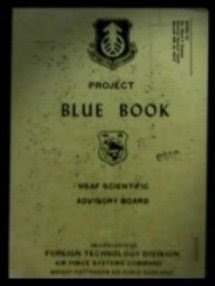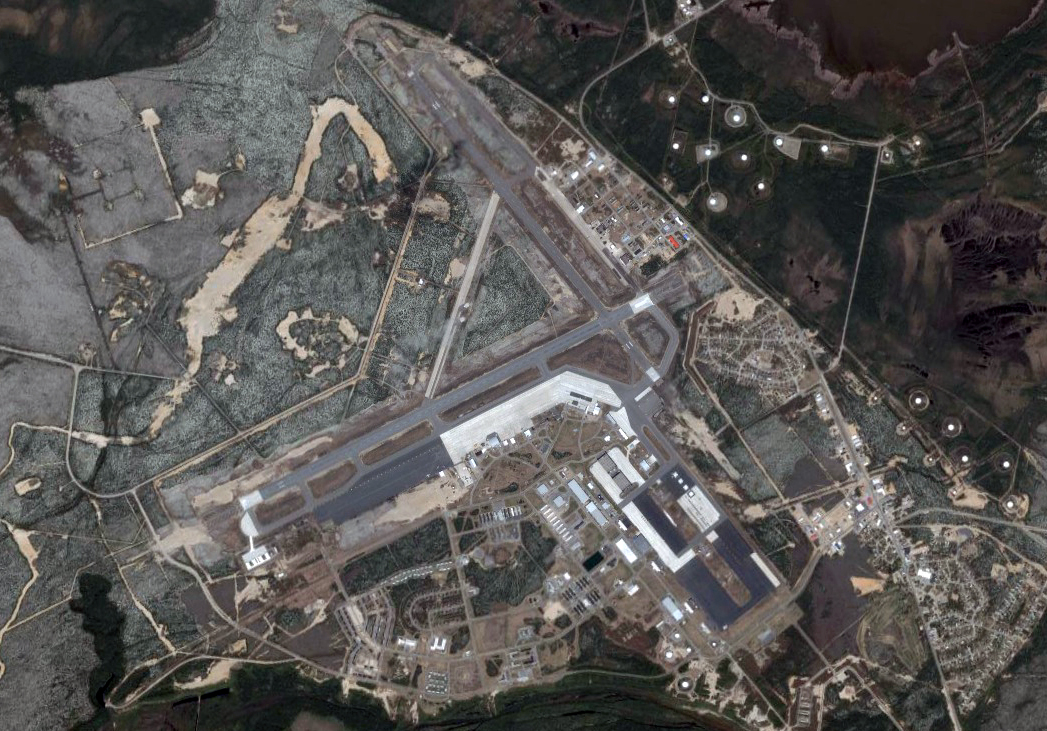Tuesday, 22 January 2019
UFO Case Directory
(SIGHTINGS FROM AIRCRAFT):
“H. S. Yellow Object Observed By T-33 Crew
Nov. 1, 1956
St. Louis, Missouri”
(NICAP.org)
The whole UFO case report:
“Brad Sparks:
Nov. 1, 1956; 60 miles E of St. Louis, Missouri, near Mt. Vernon
and Sandoval , Illinois
5:30 p.m. [11:30 a.m. CST?] USAF Capt. W. M. Lyons,
Intelligence Division Chief (Aerial Weather Recon Officer) [and Daniel?],
flying a T-33 jet trainer, saw an orange light with a blue tinge, fly across
the sky. (Berliner; FUFOR Index; etc.)
Dan Wilson:
Nov. 1, 1956; 60 miles E of St. Louis, Missouri (BBU 4489)
5:30 p.m. CST. A light yellow round light was observed
flying across the sky at an estimated speed of 1200 knots by Lt. Col Walter A.
Rosenfield, Pilot, and Captain Orville H. Daniel, Aerial Weather Reconnaissance
Officer flying in a T-33 aircraft at 35,000 feet . (Berliner;
FUFOR Index; etc.)”
NICAP.org presents U.S.
Wikipedia article: “Lockheed T-33”:
Related posts:
(wikimedia.org photo)
(tageo.com photo)
U.S. Government UFO Document:
“PROJECT 10073 RECORD CARD:
DATE: 8 August 1956/
LOCATION: 20 Mi S of Quart Site, Ariz.”
(Project Blue Book , U.S. Air Force, Washington , D.C.
Source: Fold3.com, Lindon , Utah
Quote from the document:
“One object – light, size of dime to a quarter color
bluish white, object traveled at a great speed. Object did not change color,
altitude or speed.
UNIDENTIFIED.”
The case is listed as “Unknown.”
NOTE: The town’s name is Quartzsite, not Quart Site.
Related posts:
(ufocasebook.com image)
Location of Quartzsite in La Paz County , Arizona
(text by Wikipedia) (wikimedia.org image)
U.S. Government UFO Document:
“PROJECT 10073 RECORD CARD:
DATE: 19 February 1956/
LOCATION: Houston, Texas”
(Project Blue Book , U.S. Air Force, Washington , D.C.
Source: NICAP.org
Quote from the document:
“Total duration 28 minuts minus take off time and
climb to 6,000. Pilot broke out on top at 6000 ft and observed
intense white light 1000
feet above him. He veered to the right as did the
object; he veered to the left and the object continued to right at approx 285
dgr, moved away rapidly 4-5 time his TAS which was 250 mph . No sound. No
marking. Obj disappeared towards Ft Worth-Waco area. No radar reports.
UNIDENTIFIED.”
The case is listed as “Unknown.”
Related posts:
(ufocasebook.com image)
Satellite
photo of Houston , Texas
(tageo.com
photo)
UFO Case Directory
(SIGHTINGS FROM AIRCRAFT):
“Object Evades Crew of Airliner
Feb. 19, 1956
Houston, Texas”
(NICAP.org)
The whole UFO case report:
“Brad Sparks:
Feb, 19, 1956; Houston ,
Texas
6:07 a.m. (CST). Crew of Eastern Airlines Super
Constellation saw intense white light, moving 4-5 times the speed of the
airplane, evaded by the pilot. (Berliner; FUFOR Index)
Dan Wilson:
Feb. 19, 1956; Houston ,
Texas
At 6:07 a.m. CST, an Eastern Airlines Super
Constellation airliner broke out on top of cloud cover at 1,500 feet and the crew
observed an intense white light approximately 1000 feet above the
airplane. The pilot veered the plane to the left as the object continued on to
the right at approx. 285 degrees. The object moved away rapidly at 4-5 times
the plane’s speed of 250 mph .
The object was at about 4,000
feet at this time.”
NICAP.org presents U.S.
Related posts:
Satellite
photo of Houston , Texas
(tageo.com
photo)
U.S. Government UFO Document:
“PROJECT 10073 RECORD CARD:
DATE: 12 February 1956/
LOCATION: Goose Bay, Labrador”
(Project Blue Book , U.S. Air Force, Washington , D.C.
Source: NICAP.org
Quote from the document:
“One object color green with red, rapidly circled a/c
also radar contact, 15 minutes later, radar contact again no movement and as
a/c closed on object at 8
miles distant, it faded out. Follow up report to come.
No additional info on follow-up report. UNIDENTIFIED.”
The witnesses in one of the two U.S. U.S.
The case is listed as “Unknown.”
Related posts:
(ufocasebook.com image)
U.S. Air Force Northrop F-89D-45-NO Scorpion
interceptors of the 59th Fighter Interceptor Squadrons, Goose Bay AB, Labrador
(Canada), in the 1950s. 52-1959
in foreground, now in storage at Edwards AFB, California
(tageo.com photo)
UFO Case Directory (RADCAT):
“Green & Red Object Circles Jet,
Tracked on Radar (BBU 3969)
Feb. 12, 1956
SW of Goose Bay, Labrador”
(NICAP.org)
The whole UFO case report:
“Dan Wilson:
At 10:55 local time two F-89’ s were on a routine training
mission when one fighter (with pilot Bowen and radar observer Crawford) had
visual and radar contact with an object which rapidly encircled the the F-89D.
The color of the object was predominatley green with red and seemed to be
flashing. The object was estimated to be 3/4 mile away and was observed for
about one minute. The other fighter aircraft also had radar contact. About 15
minutes later an object was observed on radar 38 miles SW of Goose Bay
by aircraft controllers. No movement. The fighters were vectored upon the
object and had radar contact but faded when the aircraft got within 8 miles . (Berliner; FUFOR
Index)”
NICAP.org presents U.S.
Wikipedia article: “CFB Goose Bay
Quote from the Wikipedia article:
“Canadian Forces Base Goose Bay (IATA: YYR, ICAO:
CYYR), commonly referred to as CFB Goose Bay, is a Canadian Forces Base located
in the municipality of Happy Valley-Goose Bay in the province of Newfoundland
and Labrador. It is operated as an air force base by the Royal Canadian Air
Force (RCAF). Its primary RCAF lodger unit is 5 Wing, commonly referred to as 5
Wing Goose Bay.
Cold War history
1950 – The Rivière-du-Loup Incident
Goose Air Base was the site of the first US nuclear
weapons in Canada, when in 1950 the United States Air Force Strategic Air
Command stationed 11 model 1561 Fat Man atomic bombs at the base in the summer,
and flew them out in December.[12] While returning to Davis–Monthan Air Force
Base with one of the bombs on board, a USAF B-50 heavy bomber encountered
engine trouble, had to drop, and conventionally detonate, the bomb over the St.
Lawrence, contaminating the river with uranium-238.
1954 – Construction of the Strategic Air
Command Weapons Storage Area[4]
Construction of Strategic Air Command's Weapons
Storage Area at Goose Air Base was officially completed in 1954.[13] The area
was surrounded by two fences, topped with barbed wire. It was the highest
security area in Goose Air Base and comprised
* One guard house
* One administration building
* Three warehouses (base spares #1, base spares #2,
supply warehouse)
* Six guard towers
* One plant group building
* Five earth covered magazines for non-nuclear weapon
storage
* Four earth covered magazines for ‘pit’ storage
(constructed with vaults and shelving to store pit ‘birdcages’)
Design and layout of the Goose Air Base weapons
storage area was identical, with only slight modifications for weather and
terrain, to the three Strategic Air Command weapons storage areas in Morocco
1958 – Construction of the Air Defence Command
ammunition storage area[4]
Construction of the Air Defence Command ammunition
storage area at Goose Air Base was completed in 1958.[15] This extension to the
Strategic Air Command weapons storage area was built directly beside the
previously constructed area, with a separate entrance. The buildings built
within the area were:
* Three storage buildings
* One guard house
* One missile assembly building.
The storage was being built to accommodate components
of the GAR-11/AIM-26 "Nuclear" Falcon, which is normally stored in
pieces, requiring assembly before use.
1976 – Departure of the USAF Strategic Air
Command and closure of Goose
AB
The former U.S.
facilities were re-designated CFB
Goose Bay Canada
Hosted deployments of units from:
Royal Air Force (United Kingdom
Wikipedia article: “Northrop F-89 Scorpion”:
Quote from the Wikipedia article:
“The Northrop F-89 Scorpion was an American
all-weather interceptor built during the 1950s, the first jet-powered aircraft
designed for that role from the outset to enter service.[3] Though its straight
wings limited its performance, it was among the first United States Air Force
(USAF) jet fighters equipped with guided missiles and notably the first combat
aircraft armed with air-to-air nuclear weapons (the unguided Genie rocket).”
Related posts:
U.S. Air Force Northrop F-89D-45-NO Scorpion
interceptors of the 59th Fighter Interceptor Squadrons, Goose Bay AB, Labrador
(Canada), in the 1950s. 52-1959
in foreground, now in storage at Edwards AFB, California
(tageo.com photo)
UFO Report:
“The 1956 UFO Chronology”
Created: 19 January 2006
Updated: 21 February 2018
(NICAP.org)
Quote from the UFO report:
“This is a 9-page report on an on-going project involving
a number of people. Without the help of Rebecca Wise (Project Blue Book
Archive), Dan Wilson, and Jean Waskiewicz, and Brad Sparks’ (Comprehensive
Catalog of Project Blue Book Unknowns), the entire project would have been
impossible.
NICAP Archivist & Site Coordinator
Aug. 8, 1956; 20 miles S of Quartzsite, Ariz.
11 p.m. (MST). Attorneys W. B. Buttermore and J. W.
Smith saw a blue-white pulsating light fly fast, straight and level. (Berliner;
FUFOR Index)
Aug. 27, 1956; Juniata ,
Penna. (BBU 4348)
9:55 p.m. Mrs. R. S. Pope saw a bright disc with a
clear dome fly vertically, then N. A very cold breeze seemed to emanate from
the object. (Berliner)
Sept. 4, 1956; Dallas ,
Texas
9 p.m. USMC T/Sgt. R. D. Rogers and family saw a large
star, changing to red color, remain stationary for 20 mins, then move W at 200
knots (230 mph ).
(Berliner)
Sept. 14, 1956; Highland ,
North Carolina
Nov. 30, 1956; Charleston AFB, South Carolina
12:48 p.m. USAF aerial navigator Maj. D. D. Grimes saw
an unspecified object fly at an estimated 100 ft altitude over water.
No further details. (Berliner)
Dec. 31, 1956 [Jan. 1, 1957?]; Guam
(BBU 4577)
2:10 a.m. USAF 1st Lt. Ted Brunson, flying an F-86D
jet interceptor, saw a round, white object fly under the jet, which was unable
to turn as sharply as the object. (Berliner; FUFOR)”
Wikipedia article: “Charleston Air Force Base”:
Quote from the Wikipedia article:
“Charleston Air Force Base (IATA: CHS, ICAO: KCHS, FAA
LID: CHS) is a United States
History
On 16 February 1954, Air Defense Command established
the 444th Fighter-Interceptor Squadron as a tenant unit on Charleston 121C Constellation appropriately named ‘City of
Charleston Charleston
Related posts:
C-130 on taxiway with C-17’s parked in the background at Charleston Air Force Base (2014) (text by Wikipedia)
(wikimedia.org photo)
Subscribe to:
Comments (Atom)








